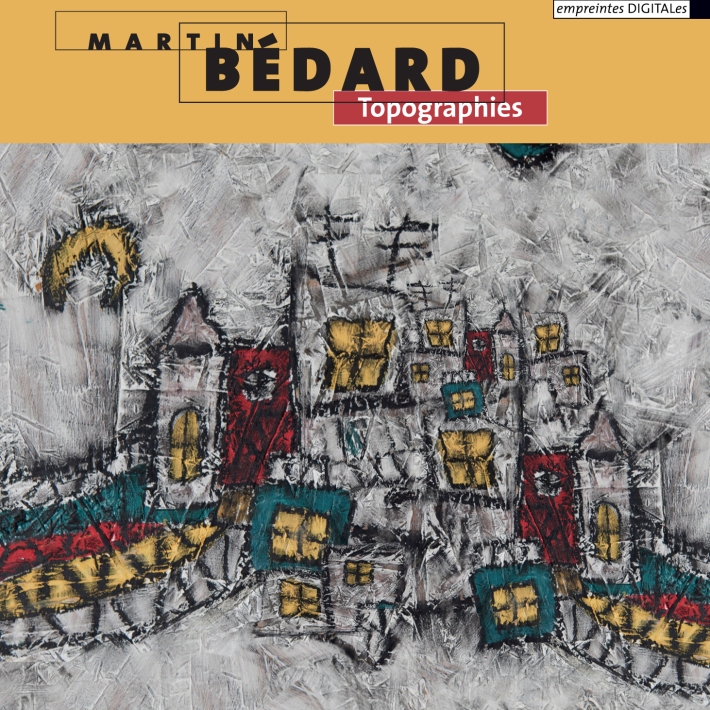
Zvukovno lomljenje kanadskog doktora elektroničke muzike.
The title of Martin Bédard highly anticipated release speaks by itself: Topographies. It is a music full of relief showing a remarkable work on high dynamics. Not one second of downtime will be met, the music being filled of a rarely seen energy. The tight discourse will bring the listener within dense and opaque spaces where he will hold his breath, left by a feeling of emptiness after a complete listening. A technically and aesthetically dazzling release. - www.electrocd.com/
“Not one second of downtime will be met”, declares the press release, and in this case, the statement is true. Martin Bédard‘s Topographies fills every sonic nook with crashes, glissandos and draws. This is a work of immediacy, beginning with a crash and continuing with a clash. At certain times, it sounds like the work of an orchestra attempting to tune during a train collision. Even in its subtler moments, it conjures images of a factory collapsing while the machinery is still running. Noiser than Zbeen, but conveying a similar respect for abrasion bordering on noise, Bédard’s work is thick and immersive, a piece of corrugated iron filled with loose nuts and bolts.
While the five pieces were composed over the course of a decade, they were mastered as one and serve as a fine primer to the Canadian composer’s work. Bédard is not only a class teacher of “auditory perception, composition, and analysis of electroacoustic music” in Montreal, he’s also a doctor. Yes, there is a place where one can get a PhD in electroacoustic composition, and the degree reflects a dedication to the cause. Thankfully, this is a release of which he can be proud; any students who read this review should know that their teacher is at the top of his game. In other words, he’s worth the tuition fee.
The earliest work included here, “Topographie de la noirceur” (“Topography of Darkness”) is also the only track short enough to be a single. In an alternate world, it might have a chance of success, as it contains four minutes of the most interesting music many will hear all year. Imagine starting one’s car and tuning in to a show like this: drums and bells and sharp glass edges. This might cause one to reevaluate one’s relationship to music. Does it have a beat? Can you dance to it? Are there lyrics? No – but a clear tempo emerges from time to time, and the sounds of coins and cannons rise to fill the sonic space.
Fast-forward a few years, and the artist has incorporated pieces of an elegant choir, along with parts of what seems like a solemn organ recital. Whooshes and percussive vibrations dominate “Champs de fouilles”, which brings to mind the passage of a subway car or clacking train. In the third minute, an approaching horn is followed by the screech of brakes, but instead of disembarking passengers, it dissolves into a murder of crows. Late in the piece, the artist also demonstrates a new restraint, allowing chords to descend into drone instead of preserving their previously agitated levels.
Similar sounds occupy “Push & Pull”, making one think that Topographies might have been better titled Transportation. This time, the brakes are applied early and often, honoring the title: push and pull, stop and go. A sample at 2:50 sounds just like the slamming of a car door, another at 4:24 like a seatbelt warning ping, and another at 6:10 (starting earlier but heard clearly here) like a crossing gate being lowered. By “Grand dehors” (2011), the glissandos are in full effect, and by “Métal fatigue” (2012) the artist’s more accessible aspects have fled, leaving in their wake a cool abstraction.
Judging by the inspirations behind these pieces, which range from to a Alexandre Zinoviev novel to a rehabilitated Quebec prison to the 400th anniversary of the provence, it’s clear that Bédard has more on his mind than just making music; he uses sound to honor his inspirations. As the artist continues to operate in the field of commissioned work, we look forward to many more creative compositions; this first collection is simply a harbinger. - Richard Allen
Available here
Selected works by Martin Bédard
violin, viola, cello, piano, and tape
viola, cello, piano, and tape
After studying for five years with composers Yves Daoust and André Fecteau, Martin Bédard received the prize magna cum laude in electroacoustic composition at the Conservatoire de musique de Montréal. In 2011, he completed a PhD in electroacoustic composition under composer Robert Normandeau at the Université de Montréal.
Bédard’s works have been programmed by over fifty national and international events. He has won or has been selected in twelve international competitions, including an Awards of Distinction at the 2010 Prix Ars electronica (Linz, Austria).
Bédard received awards from the Conseil des arts et des lettres du Québec (CALQ), the Canada Council for the Arts (CAC), the Fonds de recherche sur la société et la culture (FQRSC), the Fonds des amis de l’art (Serge-Garant Award), the Centre de création musicale Iannis Xenakis (CCMIX, France), and the Université de Montréal. In 2012, the City of Montréal - Lachine Borough gave him the Au fil de l’excellence (Best Professional Artist) Award.
Beside his work in the field of electroacoustic music, Bédard has made sound designs for various Montréal stages, like Théâtre d’aujourd’hui, Prospero, La Licorne, Monument-National, Espace Geordie, and Périscope (the latter in Québec City). He is active on the artistic committee of Réseaux des arts médiatiques.
Bédard also teaches auditory perception, composition, and analysis of electroacoustic music at the Conservatoire de musique de Montréal, and electroacoustic composition at Université de Montréal

Nema komentara:
Objavi komentar